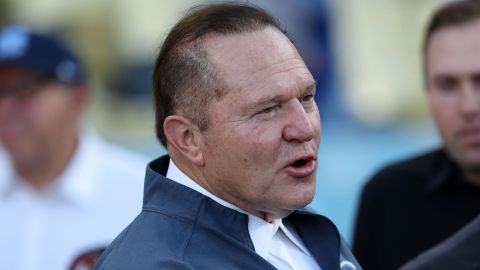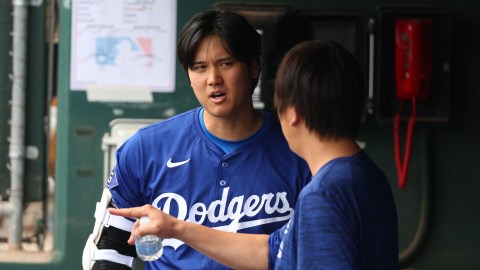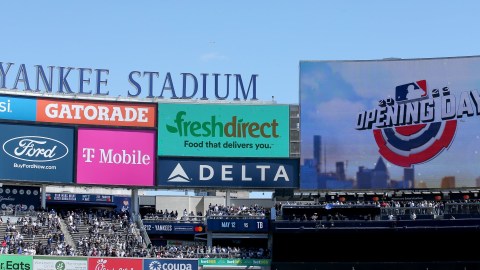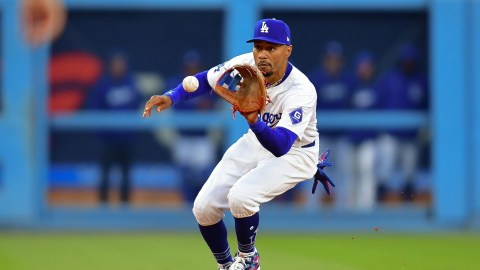 By all rights, Garret Anderson was a greater baseball player than Tim Salmon.
By all rights, Garret Anderson was a greater baseball player than Tim Salmon.
Salmon beats Anderson by .099 points in OPS, so he was probably the better overall player. But, in the context of Angels history, Anderson played two more seasons in a California/Anaheim/Los Angeles uniform, had 2,529 hits to Salmon’s 1674, had 1,365 RBIs to Salmon’s 1,016 and hit a bases-clearing double in Game 7 of the 2002 World Series which secured the Angels the only championship in their history. Yet it’s Salmon who’s still revered by Angels fans, while Anderson has been all but forgotten in the team’s history.
And the reason for that has absolutely nothing to do with performance — but perception.
Throughout his career, Anderson was unduly criticized as a “lazy” player, a falsehood which probably originated from a number of sources. For one, Anderson shared the outfield at times with players like Darin Erstad and Jim Edmonds, probably two of the most selfless players in the history of baseball in terms of sacrificing their bodies to make a play. Not only was Anderson never one to dive for a ball, but he was also a total free swinger, never taking more than 38 walks in a full season.
But these facts did not make Anderson a lazy player, nor one who “didn’t care” about the game — he just outwardly looked that way, at times, to the untrained eye. Unfortunately, the average fan is not an expert in body language.
Such is the problem in perception that a new Angel, Josh Hamilton, now faces upon his arrival in Los Angeles (of Anaheim). Granted, Hamilton may have brought a certain amount of derision upon himself when he criticized Dallas as not being a baseball city (in spite of the fact that the Rangers were third in Major League Baseball in attendance in 2012). However, that doesn’t excuse a hacky column by ESPN Dallas writer Jean-Jacques Taylor, who makes the explicit claim that Hamilton “quit on the team three times” during the latter stages of 2012.
Taylor’s problem is twofold. Not only does he have absolutely no basis for saying that Hamilton quit on his team, but the examples he does provide are only examples of Taylor’s own obstinance — ignoring the basic fact that Hamilton was injured and implying that he should have been on the field anyway.
To be sure, Hamilton was absolutely wrong when he said that Rangers fans booed him because they were “spoiled” by the team’s winning. And, in his column, Taylor correctly points out that the reasons fans booed Hamilton were due to performance, not Texas’ two consecutive World Series appearances.
However, Taylor goes on to make the claim that Rangers fans didn’t boo players like Mike Napoli and Michael Young because, unlike Hamilton, their poor performance wasn’t due to them quitting. “They tried,” says Taylor.
For one, Taylor gives far, far too much credit to the intelligence of your average sports fan. Rangers fans weren’t booing Hamilton because he quit. They booed Hamilton because he had set them up to expect superhuman feats of baseball brilliance, and struggled on the field when they needed him down the stretch.
However, struggling on the field doesn’t equate to quitting, and Taylor doesn’t really have any basis to claim that Hamilton quit on the Rangers.
The only hard example Taylor can come up with to show that Hamilton quit was Taylor’s own personal perception that Hamilton “lackadaisically” ran after a fly ball he dropped at a key moment of the Rangers’ last game of the season, against Oakland. The play, however, can be viewed by clicking here, and there’s little to suggest that Hamilton’s effort was lackadaisical.
Now, that being said, did Hamilton not absolutely sprint after the ball? Yes, Taylor has that correct. However, as the video clearly shows, one of the Rangers outfielders was (properly) backing up the play, and Hamilton doesn’t appear to peel off until he realizes someone else is going to get it. So, it would seem that Taylor cares more about outward appearances than what might actually matter in determining the outcome of the game.
But the final crime of Taylor’s, as a columnist, is basically a cardinal sin among sportswriters — criticizing a player for his legitimate injuries. To quote Taylor’s piece:
“Then he ruined his legacy by removing himself in the fourth inning of the first game of an important three-game series with the Angels. He missed the last two games of that series and the ensuing three-game series against Seattle, while he searched high and low for a doctor to come up with a diagnosis.
“Eyedrops cured Hamilton’s problem — ocular keratitis apparently caused from consuming too many energy drinks — but he missed five games. The Rangers went 3-3 on the trip.”
Taylor cites this incident as one of the three ways in which Hamilton gave up on the team, but it’s really more like Taylor stopped being a journalist or someone with reasonable sense. Was Hamilton supposed to stay out in the field when he literally couldn’t see the ball? Being that he legitimately know the cause of his eyesight problems, how was it Hamilton’s fault that he was injured?
Look, Hamilton deserves to be criticized for his uninformed opinions on the Rangers’ fan base. But that doesn’t excuse someone purveying their uninformed opinion (Taylor’s a journalist with access, so presumably he could have asked Hamilton, straight up, whether or not he was giving 100 percent effort at the end of last season).
However, instead, Taylor would rather engage in baseless speculation, baiting a player’s injuries, and questioning the effort of someone when the issue at hand is performance — just like a typical beer-chugging fan.
Hamilton’s comments may have been questionable, but they don’t give anyone, lest of all an ESPN columnist, to call his effort into question when there’s no reason to make that assumption.



